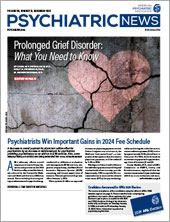The
Psychiatric News article in the September issue titled “
Exclusion Criteria for Accepting New Patients: Is it Ethical?” generated much reaction and questions from APA members. I am indeed grateful that members are reading the Ethics Corner articles and reacting to them appropriately, including raising objections. In my responses, I maintained that while psychiatrists had the right to decide whom to treat or not treat in nonemergency situations, serious and careful consideration should precede a decision to exclude patients from being accepted into a practice, with particular emphasis on what is in the best interest of the patient. In the course of my discussions, an APA member questioned whether conscientious objection to treat certain groups of patients could be considered unethical. As the APA Ethics Committee had recently published an opinion on the topic, I thought it would be best to present the ethics committee’s response.
“In medicine, conscientious objection is the refusal to perform legal, medically appropriate health care because of moral, religious, or other well-considered, deeply held personal beliefs. Examples include refusal to provide abortion services, contraception, gender-affirming treatment, physician aid in dying, assessments of capacity for assisted death, or assessments of capacity to be executed. Conscientious objection is most often an objection to providing a specific procedure or service as such. By contrast, an objection to providing that procedure or service to specific persons or types of persons—for instance, a refusal to provide reproductive services to homosexual couples when it is provided to other patients—may be considered discrimination even if the refusal is based on deeply held personal, religious, or moral beliefs.
“While conscientious objection is generally protected by many professional codes of ethics and federal and state laws, the right of a provider to conscientiously object to providing certain types of health care must not interfere with their duty to care for the patient. More specifically, the conscientious objection must not negatively impact the patient’s health or their access to legal, medically appropriate health care or information that contributes to ethically and legally appropriate informed decision-making. Physicians should not coerce patients or impose their beliefs on patients, although it may be ethically appropriate for them to inform the patient of the reason for their conscientious objection, including disclosure of their own moral beliefs and the restrictions these place on their own actions. Physicians must continue to treat patients in all other aspects of their care or determine together with the patient that a physician-patient relationship is no longer desirable and transition care appropriately.
“Generally, psychiatrists who conscientiously object to a treatment or assessment requested by or on behalf of someone with whom they have an existing physician-patient relationship should refer the patient to another psychiatrist or institution where they can obtain more comprehensive information and service as needed. In situations where psychiatrists’ moral objection is so deeply held that they decline to refer the patient, they should still ensure that the patient receives unbiased information about how to access further information about the requested treatments. See also AMA Code of Medical Ethics Opinion 1.1.7, available at
http://apapsy.ch/conscience.”
That opinion states, “Physicians should have considerable latitude to practice in accord with well-considered, deeply held beliefs that are central to their self-identities. Physicians’ freedom to act according to conscience is not unlimited, however. Physicians are expected to provide care in emergencies, honor patients’ informed decisions to refuse life-sustaining treatment, and respect basic civil liberties and not discriminate against individuals in deciding whether to enter into a professional relationship with a new patient.” ■

